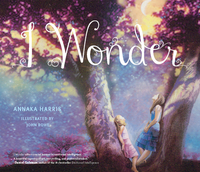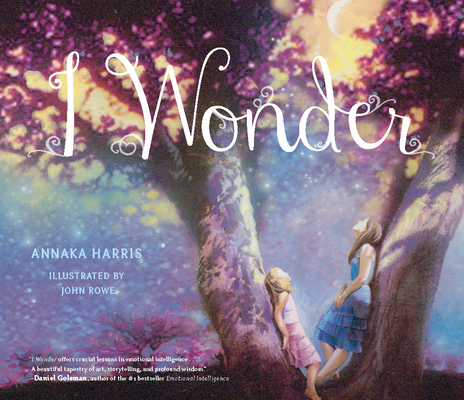18.95
1 - 2 Weken
I Wonder Q&A
Q: How did you choose the topics that are raised in I Wonder? Are the questions in the book based on conversations with your daughter or other children you've worked with?
Harris: I was inspired by my many conversations with children over the years, especially my daughter. The search for the moon came directly from her, actually. She became very interested in the moon when she was 18 months old, and she was always pointing it out in the sky. If you look closely, you'll see that the moon is in every illustration in the book.
But the choice of topics was strategic. In addition to helping children say "I don't know" to more simple questions, I wanted to delve into the questions that inspire awe. To me, they arise from four types of mysteries: 1) fundamental forces that are mysterious, like gravity; 2) the mystery of something that can be known in principle but not in practice, such as the exact number of grains of sand; 3) the inherently mysterious quality of a concept like infinity, which is impossible for us to grasp intuitively no matter how much we may "understand" it mathematically; and 4) the mysteriousness of impermanence: life and death, the fact that everything is changing from one moment to the next, and the larger question of how something comes from nothing, or why there is something at all.
At the level of our emotional experience, fear and excitement are close cousins; I wanted to point to an alternative to the fearful reaction to these concepts that is so often modeled in our culture. They can be wonderful mysteries to
enjoy!
Q: In the story, the mother asks the first question, rather than the child. Why did you begin the book this way?
Harris: I think it's important to ask children questions, guiding them in their investigations of the world, and to be interested in their unique thoughts about how things work. The book sends a message to parents that children don't have to be the only ones asking questions - we can ask our children questions about the universe too! I also wanted to get to the child's experience of not knowing as early as possible, so I began the book by directly asking a question to which her response would naturally be "I don't know." In fact, the original title for the book was
I Don't Know. And finally, I thought it was important for children hearing the story to be reassured by the mother right away, when she says, "It's okay to say,
I don't know," laying the foundation for all of the subsequent conversations in the story.
Q: What was your goal in writing this book?
Harris: I wanted to give parents and educators tools to help very young children:
1) learn to identify the feeling of not knowing, and develop language for talking about it;
2) become aware of the positive feelings associated with not knowing--awe and excitement;
3) learn to say "I don't know" with pride, rather than embarrassment or fear;
4) learn to ask questions;
5) begin to develop a capacity for postulating theories without censoring oneself;
6) learn to say "I don't know" by seeing it modeled in adults, which I believe is the most powerful way to teach children. Q: When the mother tells Eva that no one knows where gravity comes from, it seems like people could misread this, coming away thinking you're saying we don't know anything at all about gravity. Are you worried about this miscommunication? Harris: The main goal of the book was to model a new style of dialogue between adult and child. I wanted the book to be appropriate for the youngest children possible - starting at 12 to 18 months - while still addressing complex ideas. The part about gravity was difficult to writ...
1) learn to identify the feeling of not knowing, and develop language for talking about it;
2) become aware of the positive feelings associated with not knowing--awe and excitement;
3) learn to say "I don't know" with pride, rather than embarrassment or fear;
4) learn to ask questions;
5) begin to develop a capacity for postulating theories without censoring oneself;
6) learn to say "I don't know" by seeing it modeled in adults, which I believe is the most powerful way to teach children. Q: When the mother tells Eva that no one knows where gravity comes from, it seems like people could misread this, coming away thinking you're saying we don't know anything at all about gravity. Are you worried about this miscommunication? Harris: The main goal of the book was to model a new style of dialogue between adult and child. I wanted the book to be appropriate for the youngest children possible - starting at 12 to 18 months - while still addressing complex ideas. The part about gravity was difficult to writ...

- : Annaka Harris
- : Four Elephants Press
- : 9781940051048
- : Engels
- : Hardcover
- : 32
- : oktober 2013
- : 432
- : 242 x 283 x 9 mm.
- : Kinderen / tieners: fictie: algemene fictie; Kinderen / tieners: persoonlijke en sociale onderwerpen: emoties, humeur en gevoelens
